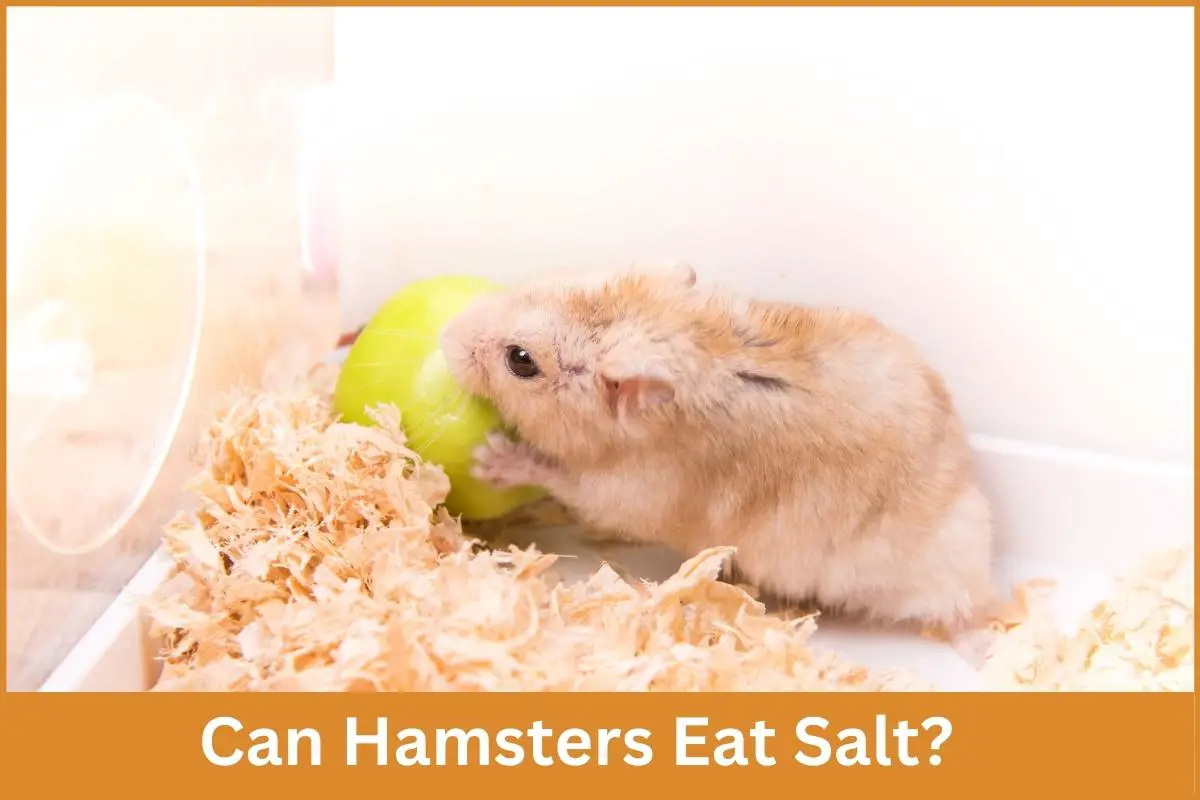Hamsters should not eat salt as it can be harmful to their health and lead to dehydration or kidney problems. It is important to provide them with a diet that meets their nutritional needs without added salt.

Key Takeaways
- Feeding salt to hamsters can lead to dehydration and kidney problems.
- Excessive salt can disrupt the balance of nutrients in a hamster’s diet.
- It is best to avoid giving hamsters salt altogether.
- Providing a balanced diet without added salt is crucial for hamster health.
What Is Salt
Generally, you should never feed your hamster salt as it can be detrimental to their health. Salt is a mineral composed of sodium and chloride, and is an essential element for humans and animals. It’s found naturally in many foods, and is also added to many processed foods.
It’s used to enhance flavor, preserve food, and improve texture. Although it can be beneficial for humans, it can be dangerous for hamsters. Too much salt can lead to dehydration and kidney problems. It can also lead to an electrolyte imbalance, which can be fatal.
Therefore, it’s important to provide a balanced diet for your hamster without added salt.
Why Is Salt Harmful to Hamsters
You may be wondering why salt is so harmful to hamsters. Salt can be harmful to hamsters’ health, as it can lead to dehydration or kidney problems. If consumed in large amounts, it can cause electrolyte imbalances which can be fatal.
Hamsters need to have a balanced diet that meets their nutritional needs, and adding too much salt can interfere with this balance. It’s best to avoid giving your hamster foods with added salt, and opt for healthy treats that are specifically designed for them.
If you’re unsure about which foods to provide, consult with a veterinarian or pet nutritionist to ensure you’re providing your hamster with the best diet possible.
Are There Alternatives to Salt
Do you know if there are any alternatives to salt that would be safe for your hamster to eat?
Luckily, there are some alternatives you can feed your hamster that provide the same levels of flavor and nutrition without the dangers of salt.
Herbs and spices are great alternatives for providing flavor to your hamster’s food. Parsley, oregano, basil, and rosemary are some great examples of healthy herbs you can feed your hamster.
Additionally, many fruits and vegetables contain natural salts which can be healthy for your pet. Carrots, celery, apples, and pears are all good options, as long as they’re washed and cut into small pieces.
The most important thing to remember is to provide your hamster with a balanced diet that meets all of their nutritional needs.
How Much Salt Is Too Much
Knowing how much salt is too much for your hamster is essential for ensuring their health and wellbeing. Generally, it’s best to avoid giving hamsters salt altogether as it can be harmful to their health.
A small pinch of salt every few weeks is the maximum amount that should be given. Too much salt can lead to dehydration and kidney problems, so it’s important to be very careful when giving your hamster salt.
If you do give your hamster salt, it’s important to stick to the recommended amount and not feed them salty snacks or processed foods. It’s also important to provide a balanced diet that meets their nutritional needs without added salt.
Are There Health Benefits to Eating Salt
Although there are no known health benefits to eating salt, it’s important to understand the potential risks of providing it to your hamster. Consuming too much salt can be detrimental to hamsters’ health, leading to dehydration and even kidney problems. Therefore, it’s important to provide them with a balanced diet that meets their nutritional needs without added salt.
Hamsters have delicate digestive systems, and salt can have a negative effect on them if consumed in large amounts. Therefore, it’s best to avoid feeding them salty snacks or treats. If you’re unsure about the nutritional value of a food, it’s best to check with your veterinarian before adding it to your hamster’s diet.
It’s also important to keep an eye on your hamster’s water intake, as salt can lead to dehydration. If your hamster is showing signs of dehydration, it’s important to seek medical attention immediately.
What Should I Do if My Hamster Eats Salt?
If your hamster has eaten salt, it’s important to take immediate action.
First, try to determine how much salt your hamster has consumed. If possible, try to remove any remaining salt from the cage.
Next, provide your hamster with plenty of fresh water to help flush the salt out of its system. You may also want to offer food to your hamster, as it may help to bind with the salt and reduce its absorption.
It’s also important to monitor your hamster’s health over the next few days, as salt poisoning can lead to dehydration or kidney problems. If you see any signs of distress, contact your veterinarian immediately.

